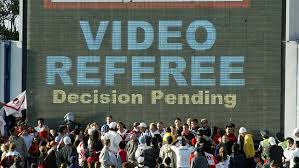By Samindra Kunti
February 10 – The Dutch FA KNVB has targeted the introduction of video referee assistance in the Dutch top-flight the Eredivisie within the next three years.
The deployment of a video assistant, who would advise the referee on the basis of TV images regarding goals, red cards and penalty situations, is in a test phase, but KNVB director of operations Gijs de Jong projects a bright future.
“It is looking good,” said de Jong. “It is no longer a matter whether the video assistant will be introduced, but when [he will be introduced]. We hope to run tests in 25 games of the Dutch cup during the 2016/17 season.”
It may be the near-culmination of a protracted process of technology introduction in the game. In 2012 IFAB, FIFA’s committee that guards the rules of the game, had insisted on the importance of keeping the sport’s human element, but took the plunge when approving the use of goal-line technology.
Today the English Premier League and the Italian Serie A both use goal-line technology. UEFA has approved the technology for both its flagship competitions, the Champions League and the European championship.
Since IFAB’s 2012 move, there have been a growing number of calls from both players and managers to use video technology in other aspects of the game as well.
Last month IFAB’s board of directors strongly recommended that video-replay trials be given the go-ahead. On March 5 IFAB will vote about the issue at its annual general meeting in Cardiff.
Germany and Brazil have both said they are willing to host trials if they are approved by IFAB. In the Netherlands, trials with video assistants have been ongoing over the past two seasons, but without contact between the video assistant and the referee on the field.
”In those encounters 51 match-deciding decisions were made,” explained de Jong. “In 12 of those decisions, the video assistant could provide the referee with the right advice. On average it took eleven seconds to give it.”
“Video assistance is a lot cheaper than the introduced goal-line technology,” said de Jong. ”The equipment costs around €300,000. Because most stadiums already have fine cameras, the costs for the video assistant can be limited.”
This month a delegation from IFAB will visit the KNVB to gather more information.
Contact the writer of this story at moc.l1745224356labto1745224356ofdlr1745224356owedi1745224356sni@i1745224356tnuk.1745224356ardni1745224356mas1745224356

